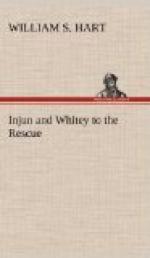Thus urged Bill began his discourse. “What started my mind workin’ on this here Injun question was somethin’ that come up to-day,” he said. “John Big Moose bein’ gone, you know, Mr. Sherwood writes me that Injun an’ Whitey is t’ go to school over to th’ Forks. So on my way back from drivin’ John t’ th’ Junction I stops at that there temple o’ knowledge, as th’ feller says, t’ prepare th’ mind o’ Jennie Adams, what teaches there, for th’ comin’ of this bunch of new scholards.
“Y’ all know Jennie, old Hog Adams’s daughter. Th’ one with th’ wart on her chin, that was engaged for matrimoney to Sid Gilman till one day they was ridin’ t’gether, an’ Sid’s cayuse slips into a gopher hole, an’ Sid falls off an’ sprains his ankle, an’ lets loose such a string o’ cuss words that Jennie—”
“Say, Bill,” protested Buck Higgins, “’f you couldn’t shoot no straighter’n you c’n talk you’d be a mighty poor risk for a insurance comp’ny. Nev’ mind this here Jennie’s history from th’ time of th’ flood. Get down t’ th’ present day.”
“Well,” Bill continued reluctantly, “I tells Jennie ‘bout Injun an’ Whitey’s bein’ ‘bout t’ be added to her string o’ pupils, an’ what d’ye s’pose she responds? That there ain’t nothin’ doin’ with Injun. That Whitey, bein’ a paleface, is entitled t’ absorb all th’ knowledge he c’n hold, but that Injun, bein’ copper-colored, has got t’ get along with other brunettes of his kind, back in some school east of here, ’specially designated by a patern’l gov’ment.”
“Did she say all them words?” demanded Charlie Bassett.
“Just like that,” Bill replied. “’S though she knew ’em by heart. Must ‘a’ bin some circular, or somep’n’ she’d learned aforehand.”
“Well, what d’ye think o’ that?” Jim Walker exploded. “Think o’ that John Big Moose, an’ all he knows, an’ him bein’ allowed t’ learn folks in some Eastern high school, an’ that there Jennie Adams, what don’t know enough t’ tell time by a kitchen clock, not bein’ puhmitted t’ learn Injun nothin’. It ain’t right.”
Bill Jordan leaned back, well satisfied with the effect he had produced. “‘Course it ain’t right,” he said. “Th’ reason for it is that th’ cemetery o’ learnin’ where John’s goin’ t’ teach is a private institootion, an’ this here shack o’ Jennie’s is controlled by th’ gov’ment. I ain’t no anarkiss, but—”
“What’s an anarkiss?” interrupted Buck.
“A feller what’s ag’in’ th’ gov’ment,” explained Bill. “You can’t make me b’lieve that our Injun ain’t as good as th’ scholards at Jennie’s emporium. Take that potato-faced brother Jim of hers, f’r instance, that’s a coyote in ‘pearance an’ a rattlesnake at heart. Why, Injun’s a—a—prince of timber buck too compared t’ him.”
Bill did not know what a Prince of Timbuctoo was, and neither did the other punchers, but it sounded impressive, and served to vent his feelings against a law which affected his friend Injun—for as such Bill, and all the men in the bunk house, regarded the boy.




